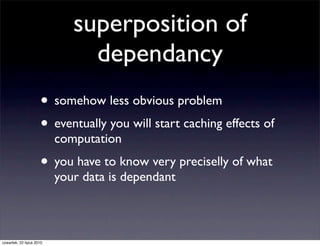Caching techniques in python, europython2010
- 1. Caching techinques in python Michael Domanski europython 2010 czwartek, 22 lipca 2010
- 2. who I am • python developer, professionally for a few years now • experienced also in c and objective-c • currently working for 10clouds.com czwartek, 22 lipca 2010
- 3. Interesting intro • a bit of theory • common patterns • common problems • common solutions czwartek, 22 lipca 2010
- 4. How I think about cache • imagine a giant dict storing all your data • you have to manage all data manually • or provide some automated behaviour czwartek, 22 lipca 2010
- 5. similar to.... • manual memory managment in c • cache is memory • and you have to controll it manually czwartek, 22 lipca 2010
- 6. profits • improved performance • ...? czwartek, 22 lipca 2010
- 7. problems • managing any type of memory is hard • automation often have to be done custom each time czwartek, 22 lipca 2010
- 8. common patterns czwartek, 22 lipca 2010
- 9. memoization czwartek, 22 lipca 2010
- 10. • very old pattern (circa 1968) • we own the name to Donald Mitchie czwartek, 22 lipca 2010
- 11. how it works • we assosciate input with output, and store in somewhere • based on the assumption that for a given input, output is always the same czwartek, 22 lipca 2010
- 12. code example CACHE_DICT = {} def cached(key): def func_wrapper(func): def arg_wrapper(*args, **kwargs): if not key in CACHE_DICT: value = func(*args, **kwargs) CACHE_DICT[key] = value return CACHE_DICT[key] return arg_wrapper return func_wrapper czwartek, 22 lipca 2010
- 13. what if output can change? • our pattern is still usefull • we simply need to add something czwartek, 22 lipca 2010
- 14. cache invalidation czwartek, 22 lipca 2010
- 15. There are only two hard problems in Computer Science: cache invalidation and naming things Phil Karlton czwartek, 22 lipca 2010
- 16. • basically, we update data in cache • we need to know when and what to change • the more granular you want to be, the harder it gets czwartek, 22 lipca 2010
- 17. code example def invalidate(key): try: del CACHE_DICT[key] except KeyError: print "someone tried to invalidate not present key: %s" %key czwartek, 22 lipca 2010
- 18. common problems czwartek, 22 lipca 2010
- 19. invalidating too much/ not enough • flushing all data any time something changes • not flushing cache at all • tragic effects czwartek, 22 lipca 2010
- 20. @cached('key1') def simple_function1(): return db_get(id=1) @cached('key2') def simple_function2(): return db_get(id=2) # SUPPOSE THIS IS IN ANOTHER MODULE @cached('big_key1') def some_bigger_function(): """ this function depends on big_key1, key1 and key2 """ def inner_workings(): db_set(1, 'something totally new') ####### ## imagine 100 lines of code here :) ###### inner_workings() return [simple_function1(),simple_function2()] if __name__ == '__main__': simple_function1() simple_function2() a,b = some_bigger_function() assert a == db_get(id=1), "this fails because we didn't invalidated cache properly" czwartek, 22 lipca 2010
- 21. invalidating too soon/ too late • your cache have to be synchronised to you db • sometimes very hard to spot • leads to tragic mistakes czwartek, 22 lipca 2010
- 22. @cached('key1') def simple_function1(): return db_get(id=1) @cached('key2') def simple_function2(): return db_get(id=2) # SUPPOSE THIS IS IN ANOTHER MODULE def some_bigger_function(): db_set(1, 'something') value = simple_function1() db_set(2, 'something else') #### now we know we used 2 cached functions so.... invalidate('key1') invalidate('key2') #### now we know we are safe, but for a price return simple_function2() if __name__ == '__main__': some_bigger_function() czwartek, 22 lipca 2010
- 23. superposition of dependancy • somehow less obvious problem • eventually you will start caching effects of computation • you have to know very preciselly of what your data is dependant czwartek, 22 lipca 2010
- 24. @cached('key1') def simple_function1(): return db_get(id=1) @cached('key2') def simple_function2(): return db_get(id=2) # SUPPOSE THIS IS IN ANOTHER MODULE @cached('key') def some_bigger_function(): return { '1': simple_function1(), '2': simple_function2(), '3': db_get(id=3) } if __name__ == '__main__': simple_function1() # somewhere else db_set(1, 'foobar') # and again db_set(3, 'bazbar') invalidate('key') # ooops, we forgot something data = some_bigger_function() assert data['1'] == db_get(id=1), "this fails because we didn't manage to invalidate all the keys" czwartek, 22 lipca 2010
- 25. summing up • know your data.... • be aware what and when you cache • take care when using cached data in computation czwartek, 22 lipca 2010
- 26. common solutions czwartek, 22 lipca 2010
- 27. process level cache czwartek, 22 lipca 2010
- 28. why? • very fast access • simple to implement • very effective as long as you’re using single process czwartek, 22 lipca 2010
- 29. clever tricks with dicts czwartek, 22 lipca 2010
- 30. code example CACHE_DICT = {} def cached(key): def func_wrapper(func): def arg_wrapper(*args, **kwargs): if not key in CACHE_DICT: value = func(*args, **kwargs) CACHE_DICT[key] = value return CACHE_DICT[key] return arg_wrapper return func_wrapper czwartek, 22 lipca 2010
- 31. invalidation czwartek, 22 lipca 2010
- 32. code example def invalidate(key): try: del CACHE_DICT[key] except KeyError: print "someone tried to invalidate not present key: %s" %key czwartek, 22 lipca 2010
- 33. application level cache czwartek, 22 lipca 2010
- 34. memcache czwartek, 22 lipca 2010
- 35. • battle tested • scales • fast • supports a few cool features • behaves a lot like dict • supports time-based expiration czwartek, 22 lipca 2010
- 36. libraries? • python-memcache • python-libmemcache • python-cmemcache • pylibmc czwartek, 22 lipca 2010
- 37. why no benchmarks • not the point of this talk :) • benchmarks are generic, caching is specific • pick your flavour, think for yourself czwartek, 22 lipca 2010
- 38. code example cache = memcache.Client(['localhost:11211']) def memcached(key): def func_wrapper(func): def arg_wrapper(*args, **kwargs): value = cache.get(str(key)) if not value: value = func(*args, **kwargs) cache.set(str(key), value) return value return arg_wrapper return func_wrapper czwartek, 22 lipca 2010
- 39. invalidation czwartek, 22 lipca 2010
- 40. code example def mem_invalidate(key): cache.set(str(key), None) czwartek, 22 lipca 2010
- 41. batch key managment czwartek, 22 lipca 2010
- 42. • what if I don’t want to expire each key manually • that’s a lot to remember • and we have to be carefull :( czwartek, 22 lipca 2010
- 43. groups? • group keys into sets • which are tied to one key per set • expire one key, instead of twenty czwartek, 22 lipca 2010
- 44. how to get there? • store some extra data • you can store dicts in cache • and cache behaves like dict • so it’s a case of comparing keys and values czwartek, 22 lipca 2010
- 45. #we start with specified key and group key='some_key' group='some_group' # now retrieve some data from memcached data=memcached_client.get_multi(key, group) # now data is a dict that should look like #{'some_key' :{'group_key' : '1234', # 'value' : 'some_value' }, # 'some_group' : '1234'} # if data and (key in data) and (group in data): if data[key]['group_key']==data[group]: return data[key]['value'] czwartek, 22 lipca 2010
- 46. def cached(key, group_key='', exp_time=0 ): # we don't want to mix time based and event based expiration models if group_key : assert exp_time==0, "can't set expiration time for grouped keys" def f_wrapper(func): def arg_wrapper(*args, **kwargs): value = None if group_key: data = cache.get_multi([tools.make_key(group_key)]+[tools.make_key(key)]) data_dict = data.get(tools.make_key(key)) if data_dict: value = data_dict['value'] group_value = data_dict['group_value'] if group_value != data[tools.make_key(group_key)]: value = None else: value = cache.get(key) if not value: value = func(*args, **kwargs) if exp_time: cache.set(tools.make_key(key), value, exp_time) elif not group_key: cache.set(tools.make_key(key), value) else: # exp_time not set and we have group_keys group_value = make_group_value(group_key) data_dict = { 'value':value, 'group_value': group_value} cache.set_multi({ tools.make_key(key):data_dict, tools.make_key(group_key):group_value }) return value arg_wrapper.__name__ = func.__name__ return arg_wrapper return f_wrapper czwartek, 22 lipca 2010
- 47. questions? czwartek, 22 lipca 2010
- 48. code samples @ http://github.com/ mdomans/europython2010 czwartek, 22 lipca 2010
- 49. follow me twitter: mdomans blog: blog.mdomans.com czwartek, 22 lipca 2010












![code example
CACHE_DICT = {}
def cached(key):
def func_wrapper(func):
def arg_wrapper(*args, **kwargs):
if not key in CACHE_DICT:
value = func(*args, **kwargs)
CACHE_DICT[key] = value
return CACHE_DICT[key]
return arg_wrapper
return func_wrapper
czwartek, 22 lipca 2010](https://image.slidesharecdn.com/europython2010-100722085349-phpapp01/85/Caching-techniques-in-python-europython2010-12-320.jpg)




![code example
def invalidate(key):
try:
del CACHE_DICT[key]
except KeyError:
print "someone tried to invalidate not present
key: %s" %key
czwartek, 22 lipca 2010](https://image.slidesharecdn.com/europython2010-100722085349-phpapp01/85/Caching-techniques-in-python-europython2010-17-320.jpg)


![@cached('key1')
def simple_function1():
return db_get(id=1)
@cached('key2')
def simple_function2():
return db_get(id=2)
# SUPPOSE THIS IS IN ANOTHER MODULE
@cached('big_key1')
def some_bigger_function():
"""
this function depends on big_key1, key1 and key2
"""
def inner_workings():
db_set(1, 'something totally new')
#######
## imagine 100 lines of code here :)
######
inner_workings()
return [simple_function1(),simple_function2()]
if __name__ == '__main__':
simple_function1()
simple_function2()
a,b = some_bigger_function()
assert a == db_get(id=1), "this fails because we didn't invalidated cache properly"
czwartek, 22 lipca 2010](https://image.slidesharecdn.com/europython2010-100722085349-phpapp01/85/Caching-techniques-in-python-europython2010-20-320.jpg)



![@cached('key1')
def simple_function1():
return db_get(id=1)
@cached('key2')
def simple_function2():
return db_get(id=2)
# SUPPOSE THIS IS IN ANOTHER MODULE
@cached('key')
def some_bigger_function():
return {
'1': simple_function1(),
'2': simple_function2(),
'3': db_get(id=3)
}
if __name__ == '__main__':
simple_function1()
# somewhere else
db_set(1, 'foobar')
# and again
db_set(3, 'bazbar')
invalidate('key')
# ooops, we forgot something
data = some_bigger_function()
assert data['1'] == db_get(id=1), "this fails because we didn't manage to invalidate all the
keys"
czwartek, 22 lipca 2010](https://image.slidesharecdn.com/europython2010-100722085349-phpapp01/85/Caching-techniques-in-python-europython2010-24-320.jpg)





![code example
CACHE_DICT = {}
def cached(key):
def func_wrapper(func):
def arg_wrapper(*args, **kwargs):
if not key in CACHE_DICT:
value = func(*args, **kwargs)
CACHE_DICT[key] = value
return CACHE_DICT[key]
return arg_wrapper
return func_wrapper
czwartek, 22 lipca 2010](https://image.slidesharecdn.com/europython2010-100722085349-phpapp01/85/Caching-techniques-in-python-europython2010-30-320.jpg)

![code example
def invalidate(key):
try:
del CACHE_DICT[key]
except KeyError:
print "someone tried to invalidate not present
key: %s" %key
czwartek, 22 lipca 2010](https://image.slidesharecdn.com/europython2010-100722085349-phpapp01/85/Caching-techniques-in-python-europython2010-32-320.jpg)





![code example
cache = memcache.Client(['localhost:11211'])
def memcached(key):
def func_wrapper(func):
def arg_wrapper(*args, **kwargs):
value = cache.get(str(key))
if not value:
value = func(*args, **kwargs)
cache.set(str(key), value)
return value
return arg_wrapper
return func_wrapper
czwartek, 22 lipca 2010](https://image.slidesharecdn.com/europython2010-100722085349-phpapp01/85/Caching-techniques-in-python-europython2010-38-320.jpg)






![#we start with specified key and group
key='some_key'
group='some_group'
# now retrieve some data from memcached
data=memcached_client.get_multi(key, group)
# now data is a dict that should look like
#{'some_key' :{'group_key' : '1234',
# 'value' : 'some_value' },
# 'some_group' : '1234'}
#
if data and (key in data) and (group in data):
if data[key]['group_key']==data[group]:
return data[key]['value']
czwartek, 22 lipca 2010](https://image.slidesharecdn.com/europython2010-100722085349-phpapp01/85/Caching-techniques-in-python-europython2010-45-320.jpg)
![def cached(key, group_key='', exp_time=0 ):
# we don't want to mix time based and event based expiration models
if group_key : assert exp_time==0, "can't set expiration time for grouped keys"
def f_wrapper(func):
def arg_wrapper(*args, **kwargs):
value = None
if group_key:
data = cache.get_multi([tools.make_key(group_key)]+[tools.make_key(key)])
data_dict = data.get(tools.make_key(key))
if data_dict:
value = data_dict['value']
group_value = data_dict['group_value']
if group_value != data[tools.make_key(group_key)]:
value = None
else:
value = cache.get(key)
if not value:
value = func(*args, **kwargs)
if exp_time:
cache.set(tools.make_key(key), value, exp_time)
elif not group_key:
cache.set(tools.make_key(key), value)
else: # exp_time not set and we have group_keys
group_value = make_group_value(group_key)
data_dict = { 'value':value, 'group_value': group_value}
cache.set_multi({ tools.make_key(key):data_dict, tools.make_key(group_key):group_value })
return value
arg_wrapper.__name__ = func.__name__
return arg_wrapper
return f_wrapper
czwartek, 22 lipca 2010](https://image.slidesharecdn.com/europython2010-100722085349-phpapp01/85/Caching-techniques-in-python-europython2010-46-320.jpg)


